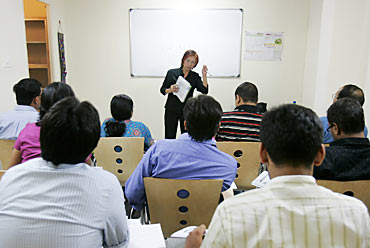Photographs: Parth Sanyal / Reuters Courtesy Business Standard
A host of education institutions in the country, including the Indian Institutes of Technology (IITs), Birla Institute of Technology and Science, Shiv Nadar University and Manipal among others, are offering dual degree programmes.
These programmes, as the name suggests, give you an option of double degree.
Given that Indian students cannot use an Indian degree when they are studying abroad, a dual degree is a good option wherein, in a four-year degree programme, students can pursue two years of their course in India and the rest abroad.
However, this dual degree, in certain cases, can be a tricky one if the institutes which enter into collaborations with international institutes do not do due diligence.
Here are some tips on what to look for before you invest your time and money in dual degree programmes.
- Find out if the Indian institute and the international institute you plan to enroll for a degree programme are accredited. Many fly-by-night operators offer such programmes.
- In the University Grants Commission(UGC) guidelines, foreign varsities entering into tie-ups with Indian partners should be among the top 500 ranked by the Times Higher Education World University Ranking or by Shanghai Jiaotong University.
- Understand what would be the Indian institute's stand if the government of the country where the partner university is located declines a student visa.
- Admission to a dual degree programme is separate and the fee is different from the normal four-year programme. Ask the institute if the fee will be re-funded in any circumstances given that cost of the two-year international education would have been factored in the fee.
- If a student plans to come back to India and pursue a career in academics, he may not be able to do so, as UGC does not recognise such a degree.
- Find out if the Indian university will grant you the degree.
- If you have done your bachelors abroad and return to India for a masters degree, unless the international university is recognised in India, your plans might come a cropper.
- Shiv Nadar University, which offers dual-degree programmes in partnership with Carnegie Mellon University, plans to introduce more such programmes in future for niche students.
- Industry experts say doing dual-degree courses from a reputed institute is important.
- Though India might not have opened up to this concept very well, there is a demand for these in global companies based in India.
- P J Lavakare, an international education consultant, says a foreign degree is valued more than a degree from a not so well-known Indian university. Such programmes are otherwise very helpful, since you get a foreign degree for a much less cost.



Comment
article